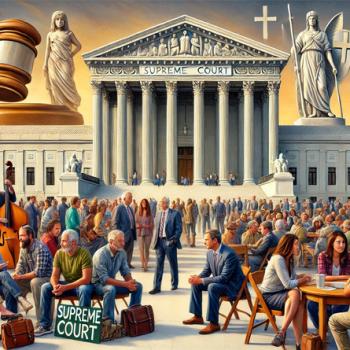Left Behind, pp. 393-395
Here, just after he finished typing Chapter 21 and just before he began churning out the first and only draft of Chapter 22, here is where I think Jerry Jenkins paused briefly to skim over the previous 392 pages.
In doing so it seems he noticed a few — but only a few — mistakes. He seems to have reconsidered the impact of the whole Babel Fish incident — the explicitly divine harmless destruction of thousands of incoming nuclear warheads high above Israel. And he seems to have realized, after repeated proselytization scenes and one full-blown conversion, that he hasn’t provided even a hint of what his evangelists and evangelizees were discussing (we’ll get to that next week).
Most writers, realizing such problems in their initial draft, would have gone back to those earlier pages and rewritten those scenes. That is, actually, what “writer” means. But Jenkins doesn’t work like that. He doesn’t do rewrites. Instead, he just begins typing Chapter 22, proceeding with the next scene — Buck’s Brief Dark Night of the Soul — while trying to squeeze in as many retroactive corrections as he can manage. This works about as well as when someone who only partially recalls the joke they are trying to tell keeps doubling back to correct the set-up or to insert something they’d left out.
The chapter begins with Buck in his apartment, unable to sleep. What the writers tell us, actually, is that he “did not sleep well.” They also tell us that he is pacing in his living room. I, for one, have usually found it difficult to sleep well while pacing in my living room.
Partly he was excited about his morning surprise. He could only hope Chloe would be happy about it. The larger part of his mind reeled with wonder. If this was true, all that Rayford Steele had postulated — and Buck knew instinctively that if any of it was true, all of it was true — why had it taken Buck a lifetime to come to it? Could he have been searching for this all the time, hardly knowing he was looking?
I don’t follow the logic, or even the “instinct,” of the idea that “if any of it was true, all of it was true.” It seems perfectly reasonable to say, for example, that Jesus’ prediction in his mini-apocalypse of “wars and rumors of wars” and of “famines and earthquakes in many places” has proven quite accurate without having to therefore embrace all the nuttery in Tim LaHaye’s or Hal Lindsay’s prophecy cult.
“If any of it was true, all of it was true” seems to be simply another version of the fundamentalist insistence that if any of it is not true, then none of it is true. This is the house-of-cards implication fundies draw from their notion of biblical “inerrancy” which, again, has very little to do with the supposed inerrancy of what the Bible actually says and everything to do with their own alleged inerrancy as its interpreters. This is what makes fundies so vehement over things that have no biblical basis — from the chronologies of LaHaye and Bishop Usher, to the insistence that David never danced, Jesus never drank or that the Book of Isaiah had a single author. Question any of that and they will respond as though you were denying the divinity of Christ or the very existence of God. All of that makes fundamentalism a very fragile construct, which is why it has to be guarded so fiercely. “If any .. then all” may just be the flip-side of that construct.
Alternatively, it could just be an expression of LaHaye’s conspiratorial side. He was once a lecturer for the John Birch Society and still advocates many of their convoluted notions about how the world “really” works. “If any of it is true, all of it is true,” sounds like the sort of thing someone would say to you just before they tell you about Groom Lake or Rose Cheramie or the Trilateral Commission.
The rest of this, Buck’s literal restlessness and his lifelong search, seems to be shooting for something like St. Augustine’s “our hearts are restless until they rest in God.” That gets a bit confused here — and even more so in the pages to come — due to Buck having been simultaneously touched by the Holy Spirit and stricken with Cupid’s arrow. Yet for all of his initial infatuation with Chloe, she’s not the Steele he can’t stop raving about:
Yet even Captain Steele — an organized, analytical airline pilot — had missed it …
Oh Captain! my Captain! I have all due respect for airline pilots. They have a difficult job with little margin for error. But this recurring motif — that airline pilots should be regarded with reverence and awe — is just getting silly. I can’t figure out why pilots should be considered particularly “analytical.” Nor do I understand why being organized and analytical would qualify one as a spiritual guru. (Tell me, O Certified Public Accountant, what is the summum bonum?)
Abruptly, Buck begins a two-page meditative flashback on his experience at ground zero during the divinely thwarted Russo-Ethiopian attack on Israel. (Buck was there to interview Chaim Rosenzweig, who had won the Nobel Prize in Chemistry despite not being an airline pilot.)
The Holy Land attack had been a watershed even in his life. He had stared his own mortality in the face …
This is, again, why Buck’s epiphanies ring so hollow. He crosses the watershed and the water is still flowing in the same direction. His life didn’t change. The experience was not a watershed; it wasn’t even a water closet. Back in the original description of Buck’s experience we read that:
Buck admitted, if only to himself, that he became a believer in God that day. … Christian friends wanted Buck to take the next step and believe in Christ, now that he was so clearly spiritually attuned. He wasn’t prepared to go that far, but he was certainly a different person and a different journalist from then on. To him, nothing was beyond belief.
Aside from these two assertions, 379 pages apart, Buck never seems particularly “spiritually attuned.” And in the more recent instance of his “staring his own mortality in the face,” his response was less spiritual and more pragmatic — he cut a deal with Carpathia to bury a story in exchange for his own life. (Also, what “Christian friends”? Lucinda and who else?)
Back to the current, revised and updated flashback:
He had stared his own mortality in the face and had to acknowledge that something otherworldly — yes, supernatural, something directly from God almighty — had been thrust upon those dusty hills in the form of a fire in the sky. And he had known beyond a doubt for the first time in his life that unexplainable things out there could not be dissected and evaluated scientifically from a detached Ivy League perspective.
Wait, which was it? Upon those dusty hills? Or in the sky? Never mind. What’s more confusing here is the same-page flip-flop from that little anti-intellectual shot to this, just one paragraph later:
Everyone in the world, at least those intellectually honest with themselves, had to admit there was a* God after that night.
So being all Ivy-League intellectual is Bad, but being intellectually honest is Good. And if you don’t believe in this particular concept of God, then you’re not intellectually honest and therefore an intellectual. Or something.
We get several more paragraphs here about how incredibly amazingly incredible and amazing this explicit miracle was and about how it left observers with no choice but to accept it as proof of the existence of God. Nice of you to catch up with your readers, Mr. Jenkins, we’ve pretty much realized that since back on page 12. We figured it out when, the night after personally swatting aside all of those missiles and planes, God appeared on a special two-hour Larry King Live to talk about it.
Mixed in with all of this miracle flashback is Buck’s rumination on something else he finds awe-inspiring — his own talent as the Greatest Investigative Reporter of All Time:
Buck had always prided himself on standing apart from the pack, for including the human, the everyday, the everyman element in his stories when others resisted such vulnerability. This skill allowed readers to identify with him, to taste and feel and smell those things most important to them. But he had still been able, even after his closest brush with death, to let the reader live it without revealing Buck’s own deep angst about the very existence of God.
So he “became a believer in God that day,” yet he has some “deep angst” about it. And after that event “everyone in the world … had to admit that there was a God,” but Buck left that out of his story. Like Marty DiBergi, Buck was more interested in making sure that readers could “smell those things most important to them.” We’re told that Buck captured those smells so vividly that he was awarded the Hemingway Prize for his report of the Holy Hand over the Holy Land, yet we readers are only allowed a single glimpse at the words Buck set down with such apart-from-the-pack skill:
To say the Israelis were caught off guard, Cameron Williams had written, was like saying the Great Wall of China was long.
This gives us a glimpse into Buck’s apparently collaborative process as a writer:
BUCK: The Israeli’s were sooo caught off guard.
STEVE: …
BUCK: I said, the Israeli’s were soooo caught off guard …
STEVE: Oh, sorry. Right. How caught off guard were they?
After witnessing Explicit Divine Intervention No. 1 in Israel, Buck then — along with the rest of the world — witnessed EDI No. 2, the Event itself:
Not that many months later came the great disappearance of millions around the world. Dozens had vanished from the plane in which he was a passenger. What more did he need? It already seemed as if he were living in a science fiction thriller.** Without question he had lived through the most cataclysmic event in history.
Odd that Buck seems to think that living through “the most cataclysmic event in history” somehow separates him from everyone else — the other 4+ billion people who lived through it too. Yet despite all the ret-conned “deep angst” in this section, neither of the global-scale EDI’s really seemed to impress him terribly deeply or to force him to change his agenda. (“The most cataclysmic event in history? Yeah, I’ll look into it, but first I gotta go check on my friend Dirk …”) Neither of those was really, for Buck, a “watershed event in his life.”
But Rayford’s description of the Two Witnesses and the Trip ‘n’ Die Guys — that rendered him sweaty and speechless.
Buck realized he’d not had a second to think in the last two weeks. …
Amidst all the retroactive revisionism of this section I’ve decided to read this as Jenkins’ own apology, or at least his excuse, for not integrating any of this into the preceding 390 pages.
– – – – – – – – – – – –
* Why just one? The freaky hail-and-meteor storm and the mystic, protective fire across the sky was clearly the work of a god (or perhaps of Dr. Stephen Strange — it was certainly more his style), but how could you be sure which one? Yes, the protection of Israel in particular would seem to point toward their God (or to a certain Miss Rosenberg), but it could also have been the handiwork of some angry Chechnyan and Somali deities who just really hated the Russians and their Ethiopian allies. Or maybe it wasn’t supernatural at all, merely a gesture of gratitude by some technologically advanced alien race who had used Dr. R’s miracle formula to revitalize their once-dying planet.
** I’ve been trying to classify that according to the TV Tropes categories. Buck seems to think he’s being genre savvy, which he’s not, but he’s not quite genre blind either, having read the back of the book along with everyone else. I want to describe this as something like “misplaced genre savvy,” maybe The Man Who Knew Too Little?
















